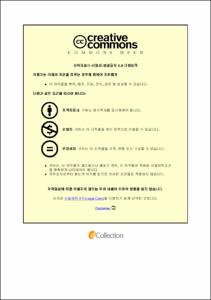구체물을 활용한 소집단 문장제 연산활동이 5세 유아의 수학 능력 및 수학적 태도에 미치는 영향
- Alternative Title
- The Effect of Small-group Arithmetic Word Problem Activity with Materials on 5 Years Old Children's Mathematical Ability and Attitude
- Abstract
- The purpose of the study is to investigate the effect of small-group arithmetic word problem activity with materials on 5 years old children's mathematical ability and attitude. Subjects for inquiry to investigate are as follows:
1. How does small-group arithmetic word problem activity with materials affect children's mathematical ability?
2. How does small-group arithmetic word problem with materials affect children's mathematical attitude?
The subjects of the study were from two classes in two different public kindergartens in B city and 34 children who attended at class for the age of five. One class in these kindergartens was selected as an experiment group(N=18) and another class was chosen as a comparison group(N=16). Small-group arithmetic word problem activities with materials were executed for experimental group and large-group normal arithmetic activities without using material were executed for comparison group. The research was carried out for 11 weeks(from 2016. 10. 10 to 2016. 12. 13) including research training, preliminary research, pre-test, experiment for 8 weeks and post-test period.
The child mathematics ability measuring tool developed by Hyekyung Hong(2006) was used as the tool for investigating children's basic arithmetic ability and mathematical problem solving tool developed by Turner(2011) was used as the tool for measuring children's arithmetic word problem solving ability. Pictorial scale of perceived competence and social acceptance for young children(Harter, 1984) modified by Eunkyung Yoon(2005) was used to examine children's mathematics attitude. The collected data was analyzed by SPSS 22.0 program for basic statics and analysis of covariance(ANCOVA) was conducted to analyzed the effect of small-group arithmetic word problem activity with materials.
The results were as follows. First, the score on mathematics ability of children was significantly higher in the experimental group than the control group.
Second, the score on mathematics attitude was significantly higher in the experimental group than the control group except in the part of competence.
Conclusively, the study showed that small-group arithmetic word problem activity with materials was effective for advancing in 5-year-old children's mathematics ability and attitude. It suggests that small-group arithmetic word problem activity with materials is worth of a meaningful teaching method in early childhood education setting.
- Issued Date
- 2017
- Awarded Date
- 2017. 8
- Type
- Dissertation
- Publisher
- 부경대학교
- Alternative Author(s)
- Kwon Eun Seo
- Affiliation
- 부경대학교 교육대학원
- Department
- 교육대학원 유아교육전공
- Advisor
- 이정화
- Table Of Contents
- ABSTRACT v
Ⅰ. 서론 1
1. 연구의 필요성 및 목적 1
2. 연구 문제 7
3. 용어의 정의 7
가. 문장제 연산 활동 7
나. 수학 능력 8
다. 수학적 태도 8
Ⅱ. 이론적 배경 9
1. 유아 수학교육의 기초 9
가. 유아 수학교육의 목적 및 목표 9
나. 유아 수학교육의 내용 10
다. 유아 수학교육의 교수․학습 방법 16
2. 유아 수학교육의 이론 및 최근 동향 19
가. 행동주의 이론과 유아 수학교육 19
나. 구성주의 이론과 유아 수학교육 20
다. 유아 수학교육의 최근 동향 26
3. 문장제 수학 27
가. 수학 문장제의 정의 및 유형 27
나. 유아의 수학 문장제 해결능력과 연산능력과의 관계 30
다. 유아 대상 수학 문장제 관련 선행연구 31
Ⅲ. 연구방법 33
1. 연구 대상 33
2. 연구 도구 34
가. 수학 능력 검사 34
나. 수학적 태도 검사 36
3. 연구 절차 38
가. 검사자 훈련 38
나. 예비연구 38
다. 사전 검사 39
라. 실험처치 40
마. 사후검사 48
4. 자료 분석 49
Ⅳ. 결과 및 해석 50
1. 구체물을 활용한 소집단 문장제 연산활동이 유아의 수학 능력에 미치는 영향 분석 50
가. 기초적 연산 능력 검사 50
나. 문장제 문제해결능력 검사 51
2. 구체물을 활용한 소집단 문장제 연산활동이 유아의 수학적 태도에 미치는 영향 분석 53
가. 수학적 태도 검사의 총합 53
나. 선호도 54
다. 자신감 55
라. 학습에 대한 열의 57
마. 유능감 58
바. 타인평가의 인식 59
Ⅴ. 논의 및 결론 61
참고문헌 64
부 록 71
- Degree
- Master
- Files in This Item:
-
-
Download
 구체물을 활용한 소집단 문장제 연산활동이 5세 유아의 수학 능력 및 수학적 태도에 미치는 영향.pdf
기타 데이터 / 973.68 kB / Adobe PDF
구체물을 활용한 소집단 문장제 연산활동이 5세 유아의 수학 능력 및 수학적 태도에 미치는 영향.pdf
기타 데이터 / 973.68 kB / Adobe PDF
-
Items in Repository are protected by copyright, with all rights reserved, unless otherwise indicated.